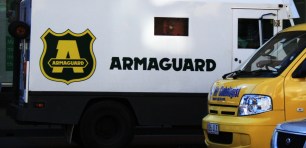
One of the six swimming pools on Hamilton Island in Queensland's Whitsunday Islands, April 12, 2011. This pool has a swim-up bar. (AAP Image/David Potts)
It has a reputation for relaxed getaways, but online debate over Hamilton Island is anything but laidback, after outspoken members of the cash preservation movement discovered the holiday hotspot has gone without cash for years.
Hamilton Island, which has a permanent population of around 1,300 people, officially went cashless during the Covid-19 pandemic.
It has stayed cash-free since, offering residents and visitors surcharge-free card payments through the EFTPOS debit network.
With no formal bank branch, limited cash banking services are available through its post office, where visitors can convert cash into pre-paid and top-up Mastercards.
The Australian reports members of social media groups dedicated to preserving cash usage are now pledging not to visit the Queensland holiday destination after recently learning of its reliance on card transactions.
“Crossing Hamilton Island off places to visit if they won’t accept cash,” one user purportedly wrote.
The once popular Australian holiday spot Hamilton Island is now cashless,” another said on a Gold Coast community board.
“Just another place to avoid.”
Holiday hotspot sparks debate
Cash usage has nosedived in Australia in recent years, with the latest Reserve Bank of Australia figures finding cash transactions accounted for just 13% of transactions in 2022.
The circulation of hard currency has fallen so far that Armaguard, one of the nation’s premiere armoured money-moving services, last year announced it would need $190 million to stay operational.
It recently rejected a $26 million bailout put forward by the big banks and key retailers.
Nevertheless, advocates for maintaining cash usage argue it remains vital for small businesses, particularly in regional communities, and holding cash can be useful if bank or payment acceptance systems go offline.
Those arguments fit in with broader fears that major banks are systematically removing branches outside city centres, limiting the physical banking options available to residents and business owners.
An ongoing Senate inquiry is investigating the ramifications of regional bank closures, and will this month hear from Queensland’s Bribie Island community.
A smaller contingent falsely argue it is illegal for business to refuse cash; businesses are free to turn down hard currency, so long as they make customers aware of payment terms before they purchase.
Despite those concerns, card payment consultant Brad Kelly argues Hamilton Island’s decision to go cashless is a sensible one.
“I understand people are upset that there’s no cash,” Kelly told SmartCompany on Tuesday.
“But understand it from the community’s point of view: how are they going to bank [cash]?
“They have to support a supermarket, a number of restaurants, a number of retail outlets, and a resort.
“How the hell do you bank that, when the nearest bank branch is in Airlie Beach, 30 kilometres away by boat?”
The cost of maintaining a branch on the island could be prohibitive to any major bank without federal assistance, argues Kelly.
To ensure regional communities can maintain access to cash, Kelly says Australia should take lessons from the UK government, which recently pledged to maintain coverage for hard currency withdrawals.
“I think it’s probably past time for that, so that’s something that the Reserve Bank of Australia needs to really consider,” he says.
Handpicked for you

Small businesses take centre stage in Albanese’s pre-budget address



COMMENTS
SmartCompany is committed to hosting lively discussions. Help us keep the conversation useful, interesting and welcoming. We aim to publish comments quickly in the interest of promoting robust conversation, but we’re a small team and we deploy filters to protect against legal risk. Occasionally your comment may be held up while it is being reviewed, but we’re working as fast as we can to keep the conversation rolling.
The SmartCompany comment section is members-only content. Please subscribe to leave a comment.
The SmartCompany comment section is members-only content. Please login to leave a comment.